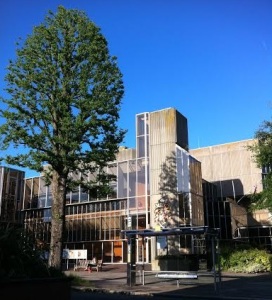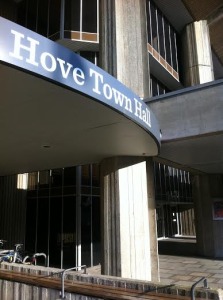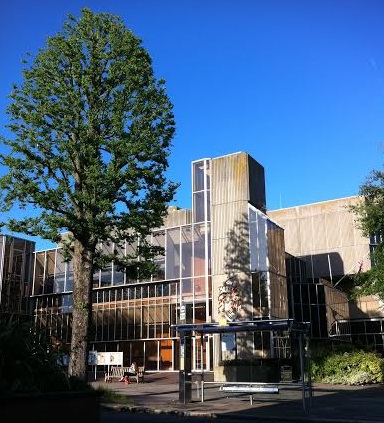The amount that we pay in council tax in the coming year is due to be decided today (Thursday 26 February).
It is decided at the annual budget meeting of Brighton and Hove City Council. It is a decision that rests with all 54 councillors who obliged to set a legal budget. It gives them less room for manoeuvre than some would like.
There are three options on the table. The minority Green administration wants to put up bills by 5.9 per cent. This is above inflation but, they are quick to point out, below the level of rises agreed when Labour was in charge. With 20 councillors, out of the 54, they are short of a majority.
 Their position is complicated by the fact that the local party recently voted to reject its own budget proposals. The concern is over the level of spending cuts that will follow even if council tax rises by 5.9 per cent
Their position is complicated by the fact that the local party recently voted to reject its own budget proposals. The concern is over the level of spending cuts that will follow even if council tax rises by 5.9 per cent
At a crisis meeting on Tuesday (24 February) the local party reversed its position to one of support for the party’s budget proposals. Not everyone was pleased with the outcome and it looks increasingly as though the Green group of councillors may be split on this high-profile vote today.
The Conservatives want the council tax to be frozen. The coalition government provides some financial compensation for those local authorities that freeze council tax – £1.2 million next year for Brighton and Hove. But it doesn’t make up for the long-term effect of having a reduced tax base.
Labour advocates a 2 per cent rise. This is known as the threshold increase because a rise in council tax above the 2 per cent threshold will trigger a referendum. Locally this would be held on the same day as the local elections and the general election.
Labour has said that a 2 per cent rise is reasonable while a 5.9 per cent rise would be less affordable for poorer people.
The party also believes that a referendum would be an unnecessary extra cost. The total is likely to be a six-figure sum. And they believe that councillors were elected to make exactly these sort of decisions.
While the Conservatives as a group oppose the idea of a referendum usually, some believe that it would have its benefits this year.
They believe that voters would turn down the 5.9 per cent rise. But if they didn’t, the council would have a bigger budget.
 The Greens position is: “Let the voters decide.” A referendum – the mechanism favoured by the government for above-threshold rises – would at least allow politicians and officials to know that the rise – or freeze – in council tax bills commanded reasonably widespread support.
The Greens position is: “Let the voters decide.” A referendum – the mechanism favoured by the government for above-threshold rises – would at least allow politicians and officials to know that the rise – or freeze – in council tax bills commanded reasonably widespread support.
One thing the parties agree on is that turnout is likely to be reasonably high – and a referendum would add to the interest.
The Scottish referendum last year showed that if voters believe that the outcome is important enough and they can influence the result, they will bother with the ballot.
The difference in the amount most people will pay is negligible whether council tax bills are frozen or rise by 2 per cent or 5.9 per cent.
Those politicians emphasising this point often cite a weekly sum while those highlighting the difference will cite the annual amount.
The difference in the council’s £750 million budget is another matter. The difference between the three parties’ positions is – at most – likely to be £5.5 million.
It may be less than 1 per cent of the annual spend but the impact will be felt by real people.
The fear among some is that the people who will feel the effect of spending cuts are those most in need of the services and support provided by the council.
A year ago councillors were unable to agree the budget at the annual meeting. Rather than negotiate through the night, they held a second meeting soon after.
Few people like to compromise but unless someone gives ground the council tax won’t be set.
If that happens, the government will send in commissioners. They will almost certainly freeze the council tax, make cuts with less local knowledge and sensitivity and render our councillors and some of our officials irrelevant.
Even most Conservatives would not want this option. It all adds to the pressure to reach an agreement at Hove Town Hall this evening.
The meeting starts at 4.30pm and is open to the public. It will also be webcast. To watch the webcast, click here.
Confused by this year’s budget? Here’s an infographic setting out how things could pan out at this afternoon’s meeting:









Politicians like to trumpet how brave THEY will be if THEY have to “make tough decisions” and it is a tired old cliché they hope puffs them up to look big to voters, to inspire ‘trust’.
The tough decision right now – countrywide – is whether to do the government’s dirty work for them as they reduce local authorities bit by bit to mere ciphers. By 2020 there is no local authority grant and all revenues need to be raised locally.
This city of students, students and more students along with quite a deep level of low-income/no income/second homer residents (along with its Unitary Authority status) makes the future position parlous.
Students are exempt from paying council tax. Given how many seriously wealthy foreign students we have, driving expensive cars and filling up the Sussex University car parks (where in my day they were all but empty),there is a question of why the government continues to protect that exemption so absolutely. Maybe the universities should be sharing that income with host towns and cities.
The seriously brave and “tough” decision today would see Labour and Greens unite against central government dictatorship control of local authority tax-setting by refusing to set a budget under the constraints imposed from Whitehall.
The council is already suffering officer inefficiencies because of cuts going back to when the Tories were in power before the Greens. The coalition is testing local government to destruction it seems to me. How sadistic.